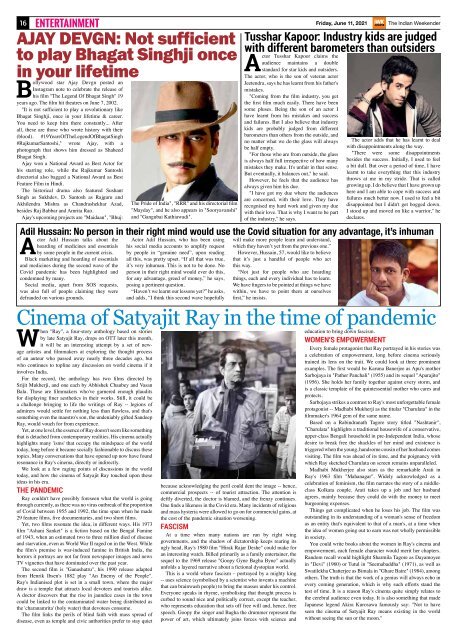The Indian Weekender, 11 June 2021
Weekly Kiwi-Indian publication printed and distributed free every Friday in Auckland, New Zealand
Weekly Kiwi-Indian publication printed and distributed free every Friday in Auckland, New Zealand
Create successful ePaper yourself
Turn your PDF publications into a flip-book with our unique Google optimized e-Paper software.
16 ENTERTAINMENT<br />
Friday, <strong>June</strong> <strong>11</strong>, <strong>2021</strong> <strong>The</strong> <strong>Indian</strong> <strong>Weekender</strong><br />
AJAY DEVGN: Not sufficient<br />
to play Bhagat Singhji once<br />
in your lifetime<br />
Bollywood star Ajay Devgn posted an<br />
Instagram note to celebrate the release of<br />
his film "<strong>The</strong> Legend Of Bhagat Singh" 19<br />
years ago. <strong>The</strong> film hit theatres on <strong>June</strong> 7, 2002.<br />
"It is not sufficient to play a revolutionary like<br />
Bhagat Singhji, once in your lifetime & career.<br />
You need to keep him there constantly... After<br />
all, these are those who wrote history with their<br />
(blood). #19YearsOf<strong>The</strong>LegendOfBhagatSingh<br />
#RajkumarSantoshi," wrote Ajay, with a<br />
photograph that shows him dressed as Shaheed<br />
Bhagat Singh.<br />
Ajay won a National Award as Best Actor for<br />
his starring role, while the Rajkumar Santoshi<br />
directorial also bagged a National Award as Best<br />
Feature Film in Hindi.<br />
<strong>The</strong> historical drama also featured Sushant<br />
Singh as Sukhdev, D. Santosh as Rajguru and<br />
Akhilendra Mishra as Chandrashekhar Azad,<br />
besides Raj Babbar and Amrita Rao.<br />
Ajay's upcoming projects are "Maidaan", "Bhuj:<br />
<strong>The</strong> Pride of India", "RRR" and his directorial film<br />
"Mayday", and he also appears in "Sooryavanshi"<br />
and "Gangubai Kathiawadi".<br />
Actor Tusshar Kapoor claims the<br />
audience maintains a double<br />
standard for star kids and outsiders.<br />
<strong>The</strong> actor, who is the son of veteran actor<br />
Jeetendra, says he has learnt from his father's<br />
mistakes.<br />
"Coming from the film industry, you get<br />
the first film much easily. <strong>The</strong>re have been<br />
some pluses. Being the son of an actor I<br />
have learnt from his mistakes and success<br />
and failures. But I also believe that industry<br />
kids are probably judged from different<br />
barometers than others from the outside, and<br />
no matter what we do the glass will always<br />
be half empty.<br />
"For those who are from outside, the glass<br />
is always half full irrespective of how many<br />
mistakes they make. It's unfair in that sense.<br />
But eventually, it balances out," he said.<br />
However, he feels that the audience has<br />
always given him his due.<br />
"I have got my due where the audiences<br />
are concerned, with their love. <strong>The</strong>y have<br />
recognised my hard work and given my due<br />
with their love. That is why I want to be part<br />
of the industry," he says.<br />
<strong>The</strong> actor adds that he has learnt to deal<br />
with disappointments along the way.<br />
"<strong>The</strong>re were some disappointments<br />
besides the success. Initially, I used to feel<br />
a bit dull. But over a period of time, I have<br />
learnt to take everything that this industry<br />
throws at me in my stride. That is called<br />
growing up. I do believe that I have grown up<br />
here and I am able to cope with success and<br />
failures much better now. I used to feel a bit<br />
disappointed but I didn't get bogged down.<br />
I stood up and moved on like a warrior," he<br />
declares.<br />
Cinema of Satyajit Ray in the time of pandemic<br />
When "Ray", a four-story anthology based on stories<br />
by late Satyajit Ray, drops on OTT later this month,<br />
it will be an interesting attempt by a set of newage<br />
artistes and filmmakers at exploring the thought process<br />
of an auteur who passed away nearly three decades ago, but<br />
who continues to topline any discussion on world cinema if it<br />
involves India.<br />
For the record, the anthology has two films directed by<br />
Srijit Mukherji, and one each by Abhishek Chaubey and Vasan<br />
Bala. <strong>The</strong>se are filmmakers who've garnered enough plaudits<br />
for displaying finer aesthetics in their works. Still, it could be<br />
a challenge bringing to life the writings of Ray -- legions of<br />
admirers would settle for nothing less than flawless, and that's<br />
something even the maestro's son, the undeniably gifted Sandeep<br />
Ray, would vouch for from experience.<br />
Yet, at one level, the essence of Ray doesn't seem like something<br />
that is detached from contemporary realities. His cinema actually<br />
highlights many 'isms' that occupy the mindspace of the world<br />
today, long before it became socially fashionable to discuss these<br />
topics. Many conversations that have opened up now have found<br />
resonance in Ray's cinema, directly or indirectly.<br />
We look at a few raging points of discussions in the world<br />
today, and how the cinema of Satyajit Ray touched upon these<br />
ideas in his era.<br />
THE PANDEMIC<br />
Ray couldn't have possibly foreseen what the world is going<br />
through currently, as there was no virus outbreak of the proportion<br />
of Covid between 1955 and 1992, the time span when he made<br />
29 feature films, five documentaries, and two short films.<br />
Yet, two films resonate the idea, in different ways. His 1973<br />
film "Ashani Sanket" is a fiction based on the Bengal Famine<br />
of 1943, when an estimated two to three million died of disease<br />
and starvation, even as World War II raged on in the West. While<br />
the film's premise is war-induced famine in British India, the<br />
horrors it portrays are not far from newspaper images and news<br />
TV vignettes that have dominated over the past year.<br />
<strong>The</strong> second film is "Ganashatru", his 1990 release adapted<br />
from Henrik Ibsen's 1882 play "An Enemy of the People".<br />
Ray's <strong>Indian</strong>ised plot is set in a small town, where the major<br />
draw is a temple that attracts local devotees and tourists alike.<br />
A doctor discovers that the rise in jaundice cases in the town<br />
could be linked to the contaminated water being distributed as<br />
the 'charanamrita' (holy water) that devotees consume.<br />
<strong>The</strong> film links the perils of blind faith with mass spread of<br />
disease, even as temple and civic authorities prefer to stay quiet<br />
because acknowledging the peril could dent the image -- hence,<br />
commercial prospects -- of tourist attraction. <strong>The</strong> attention is<br />
deftly diverted, the doctor is blamed, and the frenzy continues.<br />
One finds a likeness in the Covid era. Many incidents of religious<br />
and mass hysteria were allowed to go on for commercial gains, at<br />
the cost of the pandemic situation worsening.<br />
FASCISM<br />
At a time when many nations are run by right wing<br />
governments, and the shadow of dictatorship keeps rearing its<br />
ugly head, Ray's 1980 film "Hirak Rajar Deshe" could make for<br />
an interesting watch. Billed primarily as a family entertainer, the<br />
sequel to the 1969 release "Goopy Gyne Bagha Byne" actually<br />
unfolds a layered narrative about a fictional dystopian world.<br />
This is a world where fascism – portrayed by a mighty king<br />
-- uses science (symbolised by a scientist who invents a machine<br />
that can brainwash people) to bring the masses under his control.<br />
Everyone speaks in rhyme, symbolising that thought process is<br />
curbed to sound nice and politically correct, except the teacher,<br />
who represents education that sets off free will and, hence, free<br />
speech. Goopy the singer and Bagha the drummer represent the<br />
power of art, which ultimately joins forces with science and<br />
Tusshar Kapoor: Industry kids are judged<br />
with different barometers than outsiders<br />
Adil Hussain: No person in their right mind would use the Covid situation for any advantage, it’s inhuman<br />
Actor Adil Hussain talks about the<br />
hoarding of medicines and essentials<br />
by some people in the current crisis.<br />
Black marketing and hoarding of essentials<br />
and medicines during the second wave of the<br />
Covid pandemic has been highlighted and<br />
condemned by many.<br />
Social media, apart from SOS requests,<br />
was also full of people claiming they were<br />
defrauded on various grounds.<br />
Actor Adil Hussain, who has been using<br />
his social media accounts to amplify request<br />
by people in “genuine need”, upon reading<br />
all this, was pretty upset. “If all that was true,<br />
it’s very inhuman. This is not to be done. No<br />
person in their right mind would ever do this,<br />
for any advantage, greed of money,” he says,<br />
posing a pertinent question.<br />
“Haven’t we learnt our lessons yet?” he asks,<br />
and adds, “I think this second wave hopefully<br />
will make more people learn and understand,<br />
which they haven’t yet from the previous one.”<br />
However, Hussain, 57, would like to believe<br />
that it’s just a handful of people who act<br />
this way.<br />
“Not just for people who are hoarding<br />
things, each and every individual has to learn.<br />
We have fingers to be pointed at things we have<br />
within, we have to point them at ourselves<br />
first,” he insists.<br />
education to bring down fascism.<br />
WOMEN'S EMPOWERMENT<br />
Every female protagonist that Ray portrayed in his stories was<br />
a celebration of empowerment, long before cinema seriously<br />
trained its lens on the trait. We could look at three prominent<br />
examples. <strong>The</strong> first would be Karuna Banerjee as Apu's mother<br />
Sarbojaya in "Pather Panchali" (1955) and its sequel "Aparajito"<br />
(1956). She holds her family together against every storm, and<br />
is a classic template of the quintessential mother who cares and<br />
protects.<br />
Sarbojaya strikes a contrast to Ray's most unforgettable female<br />
protagonist -- Madhabi Mukherji as the titular "Charulata" in the<br />
filmmaker's 1964 gem of the same name.<br />
Based on a Rabindranath Tagore story titled "Nashtanir",<br />
"Charulata" highlights a traditional housewife of a conservative,<br />
upper-class Bengali household in pre-Independent India, whose<br />
desire to break free the shackles of her mind and existence is<br />
triggered when the young, handsome cousin of her husband comes<br />
visiting. <strong>The</strong> film was ahead of its time, and the poignancy with<br />
which Ray sketched Charulata on screen remains unparalleled.<br />
Madhabi Mukherjee also stars as the remarkable Arati in<br />
Ray's 1963 film "Mahanagar". Widely acknowledged as a<br />
celebration of feminism, the film narrates the story of a middleclass<br />
Kolkata couple. Arati takes up a job and her husband<br />
agrees, mainly because they could do with the money to meet<br />
burgeoning expenses.<br />
Things get complicated when he loses his job. <strong>The</strong> film was<br />
outstanding in its understanding of a woman's sense of freedom<br />
as an entity that's equivalent to that of a man's, at a time when<br />
the idea of women going out to earn was not wholly permissible<br />
in society.<br />
You could write books about the women in Ray's cinema and<br />
empowerment, each female character would merit her chapters.<br />
Random recall would highlight Sharmila Tagore as Dayamoyee<br />
in "Devi" (1960) or Tutul in "Seemabaddha" (1971), as well as<br />
Swatilekha Chatterjee as Bimala in "Ghare Baire" (1984), among<br />
others. <strong>The</strong> truth is that the work of a genius will always echo in<br />
every coming generation, which is why such efforts stand the<br />
test of time. It is a reason Ray's cinema quite simply relates to<br />
the cerebral audience even today. It is also something that made<br />
Japanese legend Akira Kurosawa famously say: "Not to have<br />
seen the cinema of Satyajit Ray means existing in the world<br />
without seeing the sun or the moon."


















